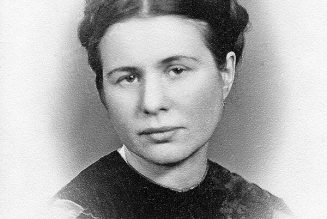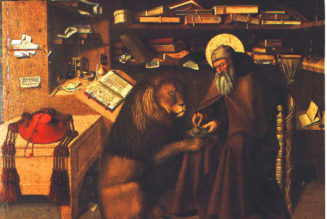
We all want greatness. We want to be something special in the eyes of God and our peers. God wants that too, and Jesus tells us how to do it this Sunday, the 25th Sunday in Ordinary Time, Year B.
It’s a lot easier — and a lot harder — than we realize.
Jesus gives a tough message to his disciples in Sunday’s Gospel. It goes in one ear and out the other.
The Gospel finds Jesus on the road, passing through Galilee, teaching his disciples: “The Son of man will be delivered into the hands of men, and they will kill him; and when he is killed, after three days he will rise.’”
But they don’t understand what he is saying, so they block it out and daydream instead. They start imagining the Kingdom Jesus has spoken of, then argue about who will be in charge of what when their band of brothers finally defeats the mighty Romans and Christ the Conqueror takes up his royal scepter.
When they get to Capernaum, Jesus asks them, “What were you discussing along the way?” Simply hearing that question from Jesus is enough to slap them back to reality. They answer with an embarrassed silence.
The disciples already know that they were wrong, because they have heard Sunday’s first reading, from Wisdom, which echoes last Sunday’s Suffering Servant passage in Isaiah. The Book of Wisdom describes how the world will receive the Messiah; by saying, “Let us condemn him to a shameful death.”
More than that, the disciples know they are wrong because Jesus has told them, many times.
They have heard the Beatitudes, where Jesus went up to the mountain like a new Moses and gave them new commandments: to be meek, poor, pure, and persecuted. They have heard him say they should to go the extra mile and give the shirt off their back to those in need, and that even to their enemies deserve their love.
And they know that Jesus has poured his heart out twice about the serious, fatal, mission he is on, a mission to go into the heart of his enemies and take the punishment they give him, up to and including his death. So when Jesus confronts them, they don’t want to admit that they were jockeying for position while he was marching to his death.
We are the same way. Jesus last week told us that there is no love without suffering. We heard it in Mass, with a giant crucifix in front of our eyes telling us exactly what “take up your cross and follow me” means.
What we were supposed to do was clear: Stop pampering ourselves and start mortifying and sacrificing for the sake of our families, our communities, and our God, and give up that one thing we have refused to give up for so long.
But what did we do instead? We jockeyed for position, tried to get ahead, tried to maximize our comfort in this life, lied in word and deed to make ourselves look better, and tried to minimize our pain. We argued, with the way we live our lives, that we are the greatest. At least I did.
Jesus’s answer is to put a child in our midst.
Jesus so often gives his apostles “object lessons,” teaching with visual aids. On a previous trip by the cliffs of Arbel to the rocks of Capernaum, he said to Peter, “You are rock, and on this rock I will build my Church.”
Now he shows them a child to teach them several things: “You are being childish,” for one; but also “You know very little,” and “Even this child is greater than you.”
But the words he says are important, also: “If anyone wishes to be first, he shall be the last of all and the servant of all,” he says, and, “Whoever receives one such child in my name receives me; and whoever receives me, receives not me but him who sent me.”
Children can do nothing for us. They can’t serve us or confer wealth or status. They only take. Yet Jesus says that to receive them means receiving God the Son and God the Father. After all, Jesus himself became a child who was welcomed by shepherds and foreigners but was rejected by his political and religious leaders, Herod and his theological consultants.
To receive a child means to receive the image and likeness of God; to refuse a child means to refuse the image and likeness of God. And service is what makes you great, because it means serving God himself.
If that’s real greatness, think of the consequences for mothers and fathers, bishops and priests.
If serving children makes you great, then a mom is greater than a CEO, a faithful father is greater than a billionaire; and what we do at home far greater than what we do in the office. If what Jesus says is true, it makes openness to life true greatness and makes contraception and abortion our nation’s great refusal of God himself.
This Gospel also clarifies the jobs of bishops and priests who the Catechism says should be “slaves of Christ” who “must freely become the slaves of all.”
And so we can ask, how has the Church fared by this standard? How has the Church in our day served children? The sex abuse crisis is the most obvious but least common of the many ways the Church has failed children.
Remember: Jesus said, “Whoever causes one of these little ones who believe in me to sin,” would be better off drowned in the sea. The Church has caused the last two generations of little ones to sin, by failing to bring them to the sin-breaking sacrament of confession; by failing to teach them about the purifying Real Presence of Jesus Christ in the Eucharist; by failing to teach them the horror of sin and the happiness that only comes from faith and virtue. By refusing to receive these children into the fullness of the truth, we have refused to receive God himself.
The Second Reading, from James, tells us exactly how this happened.
James says, “Where jealousy and selfish ambition exist, there is disorder and every foul practice.”
Lay people should understand what he is saying to us: Where we live our lives to outdo others, where our thought each day is for our own comfort, where we put office emails before our family at home, we become closed to life and closed to God.
Priests and bishops should understand what Jesus is saying to them: By refusing to be “slaves of all,” by failing to prioritize soul-saving, and by refusing to find a way to confront the sins that lead their flocks to hell, they quickly become bad shepherds who demand sacrifices but make none themselves. They will give in to their passions and teach others to do the same, leading to conflicts, envy, and even war, James says.
Instead, he says to seek “the wisdom from above,” which is a gift of the Holy Spirit. This grace will make lay and clergy “peaceable, gentle, compliant, full of mercy and good fruits, without inconstancy or insincerity.”
So, it’s a lot harder than we thought it was to achieve greatness. But so much easier.
We have heard what the Apostles heard: We know that a follower of Christ must “take up his cross daily and follow me” and that means deep prayer, sacrificial service of others, and costly almsgiving.
That requires self-denunciation, which is very difficult. It takes a broken spirit and a heart willing to say, “Jesus, I must decrease and you must increase, in how I live my life and in how I treat every person I meet.”
Jesus always answers that prayer by giving us a shortcut to greatness, taking us from last place in line to first.
Image: A student of Benedictine College in Atchison, Kansas, on mission to Jamaica.
Join Our Telegram Group : Salvation & Prosperity









